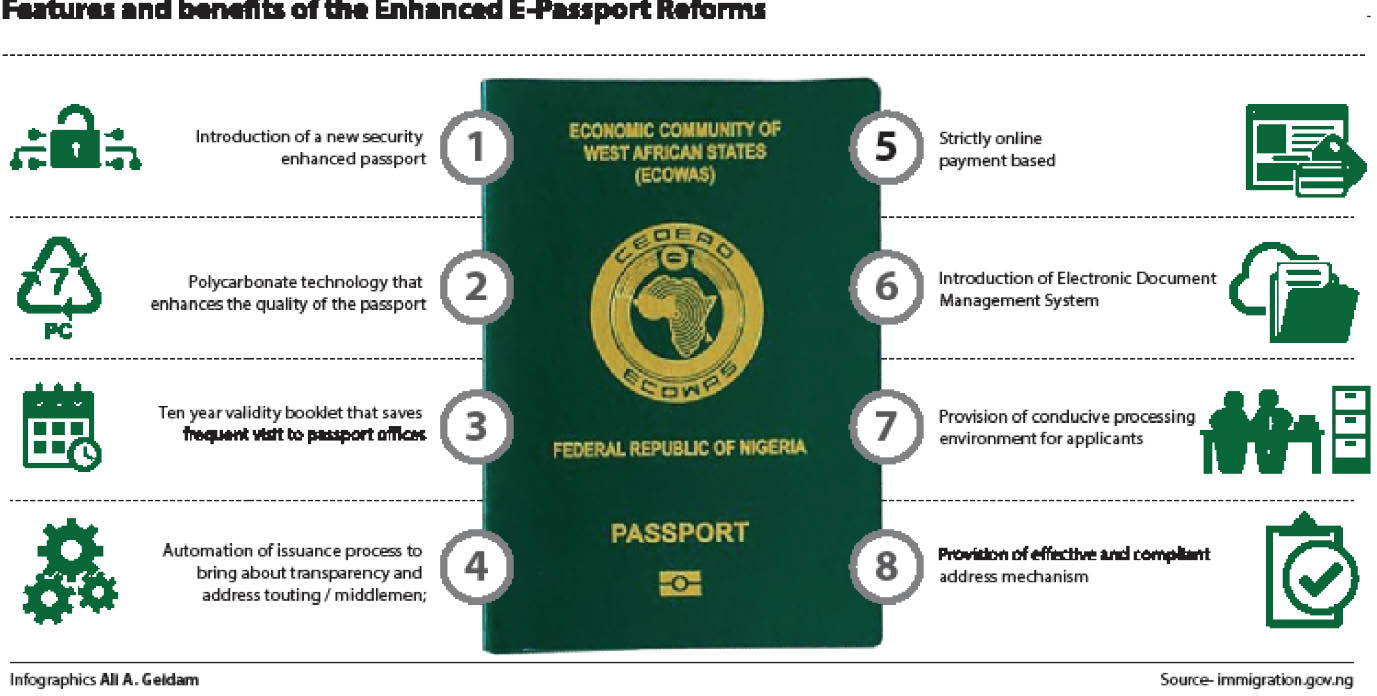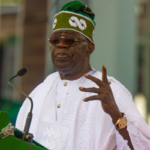On January 16, 2019, President Muhammadu Buhari launched the new 64-page enhanced Electronic International Passport which has a 10-year validity period.
Daily Trust had in November 2019 reported that many months after its launch, the Nigeria Immigration Service (NIS) was yet to commence the issuance of the new enhanced electronic passport after an initial announcement that the rollout had been rescheduled to begin on April 29, 2019.
When the particulars of President Buhari were captured on the day the new travel document was launched, he was an hour later issued with a new passport at the council chamber of the Presidential Villa, Abuja.
Then minister of Interior, Abdulrahman Dambazau, said the enhanced e-passport addresses the problem of identity theft and that it is in compliance with the International Civil Aviation Organisation (ICAO) requirement.
Also speaking, the Comptroller General of NIS, Mohammed Babandede, said there are 25 differences between the old passport and the new e-passport.
Though there are still complaints about the availability of the new passport in some parts of the country, security experts who spoke with Daily Trust said the e-passport is now one of the most secured in the world.
The NIS comptroller-general, while speaking at the commencement and issuance of the new enhanced passport in Lagos last December, said global compliance necessitated the move to introduce the new document. Babandede was represented by the Comptroller of Immigration, Passport Office, Zone A, Lagos, Helen Nwazurike.He said: “The enhanced e-passport is an improved version of the existing e-passport. The technology behind this passport is the most recent in terms of security features and biometrics, according to the standards of the International Civil Aviation Organisation. One of the most significant differences between the passport we are rolling out and the existing one is the supplemented access control.”
What difference does it make?
Daily Trust reports while many Nigerians feel the new passport is just another way of generating revenue for government, Olayinka Fisher, Managing Director of IRIS Smart Technologies Limited (the company producing the e-passports for Nigeria), told Daily Trust that the wisdom behind the initiative was to secure Nigeria.
“Gone are the days when Nigeria’s passport was printed and easily obtained at Oluwole Street in Lagos. With the e-passport, the country has cleaned up its image and enhanced its brand reputation,” he said.
According to him, Nigerians in the Diaspora, an important community with significant visibility, are the greatest beneficiaries of the new e-passport regime.
“They no longer queue at Nigerian embassies abroad in endless wait for passport renewal. Now they can renew their Nigerian passport with much ease and satisfaction,” he said.
Challenges ahead
Notwithstanding the present strength of the Nigerian passports, some security experts are worried over the identity problem in the country.
A senior staff at the Ministry of Interior, who spoke to Daily Trust in confidence, said Nigeria has a serious security problem as it is having identity crisis, but quickly added that that is one of the issues the new passport is to address.
“The British left us with a birth and death registry but this has disappeared over time. The system has collapsed. We have neither automated it nor kept it.
“Now, we have many births and deaths not being recorded by the government. It is easy for anyone to go to any local government authority and claim citizenship without any means of confirming claims.
“People go to court and get affidavit, claim dates and places of birth that cannot be confirmed by authorities,” he noted. He said the travel restrictions recently slammed on Nigeria by the US is connected to the identity challenge.
The proclamation on improving enhanced vetting capabilities and processes for detecting attempted entry, issued by the US on January 31, 2020, said: “Nigeria does not comply with the established identity-management and information-sharing criteria assessed by the performance metrics.
“Nigeria does not adequately share public-safety and terrorism-related information, which is necessary for the protection of national security and public safety of the United States.
“Nigeria also presents a high risk, relative to other countries in the world, of terrorist travel to the United States,” it said.
Analysts believe that going by the fact that Nigeria is at present creating an identity database through the National Identity Number (NIN), serious documents should be synchronised with the number as a way of addressing the concern of the international community.
Speaking on the matter, Dr Sule Ya’u said the new e-passport is strengthened by the engraving of a holder’s NIN.
“Another important feature is the Multi Laser Image (MLC), which captures the primary and secondary image of a passport holder. This heightened tamper-proof feature gives the passport double-safety uniqueness and dissuades attempts to duplicate or forge it. It also comes in a higher quality material than the previous one,” he said.
He added that looking at the reasons the United States placed travel restrictions on Nigeria, it would be safe to say that the improved security features and authenticity of the new e-passport are a succour for travellers.
“What is clear is that the restrictions do not affect student visas, temporary visitor visas. Any Nigerians with a valid immigrant visa or is on their way to the United States with an immigrant visa will not be affected or denied entry as a result of the ban,” he said.
Passport, as a travel document, was first introduced in Nigeria in 1948 after the Second World War and was then called the British West African Passport. The colour then was brown and the booklet was bulky, with 63 pages.
At independence in 1960, Nigeria changed the colour to light green and reduced the pages to 32 and the Ministry of Foreign Affairs became the issuing authority.
In 1988, the authority to issue all travel documents in Nigeria was transferred to NIS and in 1998, a significant change occurred with the introduction of the Machine Readable Passport (MRP) which presented a major shift from the hand written, manual method.
However, the MRP also had its own shortcomings which included proxy issuance i.e. non-physical appearance of applicant, multiple issuance, and identity theft, alteration of age, picture and pagination while security features were weak.
These deficiencies led to the introduction of the e-passport on July 27, 2007, when then Comptroller-General of Nigeria Immigration Service, Mr J. C. Ude, issued then No. 1 citizen of the Federal Republic of Nigeria, Alhaji Umaru Musa Yar’Adua, with the e-passport at the Presidential Villa in Abuja.

 Join Daily Trust WhatsApp Community For Quick Access To News and Happenings Around You.
Join Daily Trust WhatsApp Community For Quick Access To News and Happenings Around You.


